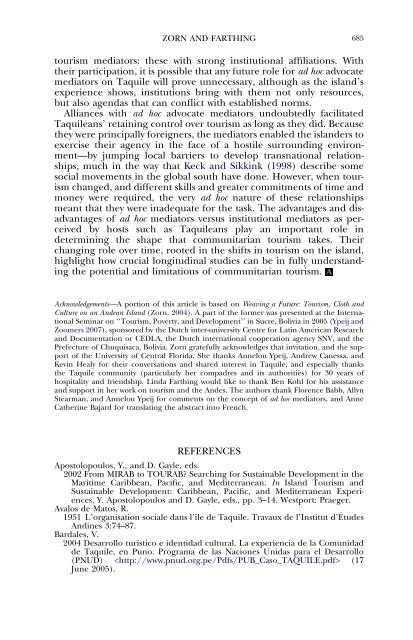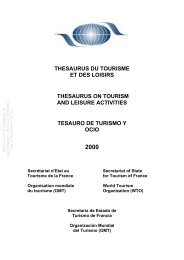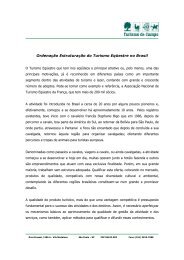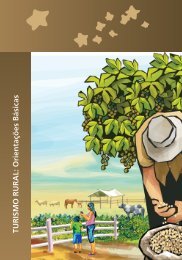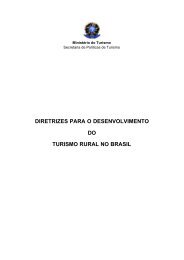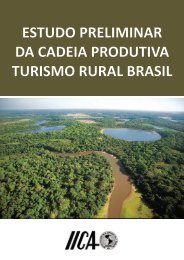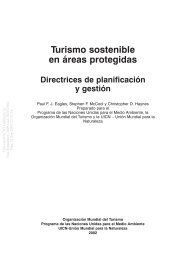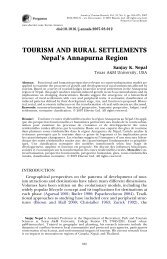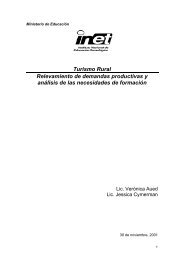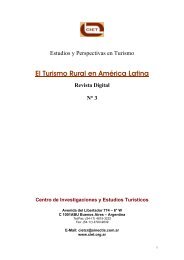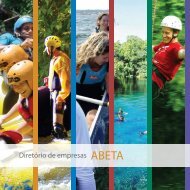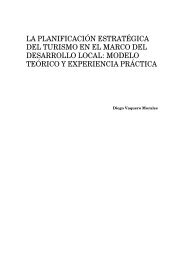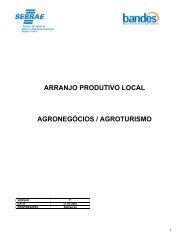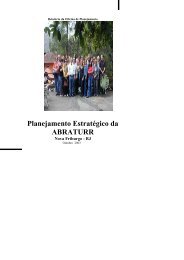COMMUNITARIAN TOURISM Hosts and Mediators in Peru
COMMUNITARIAN TOURISM Hosts and Mediators in Peru
COMMUNITARIAN TOURISM Hosts and Mediators in Peru
Create successful ePaper yourself
Turn your PDF publications into a flip-book with our unique Google optimized e-Paper software.
ZORN AND FARTHING 685<br />
tourism mediators: these with strong <strong>in</strong>stitutional affiliations. With<br />
their participation, it is possible that any future role for ad hoc advocate<br />
mediators on Taquile will prove unnecessary, although as the isl<strong>and</strong>’s<br />
experience shows, <strong>in</strong>stitutions br<strong>in</strong>g with them not only resources,<br />
but also agendas that can conflict with established norms.<br />
Alliances with ad hoc advocate mediators undoubtedly facilitated<br />
Taquileans’ reta<strong>in</strong><strong>in</strong>g control over tourism as long as they did. Because<br />
they were pr<strong>in</strong>cipally foreigners, the mediators enabled the isl<strong>and</strong>ers to<br />
exercise their agency <strong>in</strong> the face of a hostile surround<strong>in</strong>g environment—by<br />
jump<strong>in</strong>g local barriers to develop transnational relationships,<br />
much <strong>in</strong> the way that Keck <strong>and</strong> Sikk<strong>in</strong>k (1998) describe some<br />
social movements <strong>in</strong> the global south have done. However, when tourism<br />
changed, <strong>and</strong> different skills <strong>and</strong> greater commitments of time <strong>and</strong><br />
money were required, the very ad hoc nature of these relationships<br />
meant that they were <strong>in</strong>adequate for the task. The advantages <strong>and</strong> disadvantages<br />
of ad hoc mediators versus <strong>in</strong>stitutional mediators as perceived<br />
by hosts such as Taquileans play an important role <strong>in</strong><br />
determ<strong>in</strong><strong>in</strong>g the shape that communitarian tourism takes. Their<br />
chang<strong>in</strong>g role over time, rooted <strong>in</strong> the shifts <strong>in</strong> tourism on the isl<strong>and</strong>,<br />
highlight how crucial longitud<strong>in</strong>al studies can be <strong>in</strong> fully underst<strong>and</strong><strong>in</strong>g<br />
the potential <strong>and</strong> limitations of communitarian tourism.<br />
Acknowledgements—A portion of this article is based on Weav<strong>in</strong>g a Future: Tourism, Cloth <strong>and</strong><br />
Culture on an Andean Isl<strong>and</strong> (Zorn, 2004). A part of the former was presented at the International<br />
Sem<strong>in</strong>ar on ‘‘Tourism, Poverty, <strong>and</strong> Development’’ <strong>in</strong> Sucre, Bolivia <strong>in</strong> 2005 (Ypeij <strong>and</strong><br />
Zoomers 2007), sponsored by the Dutch <strong>in</strong>ter-university Centre for Lat<strong>in</strong> American Research<br />
<strong>and</strong> Documentation or CEDLA, the Dutch <strong>in</strong>ternational cooperation agency SNV, <strong>and</strong> the<br />
Prefecture of Chuquisaca, Bolivia. Zorn gratefully acknowledges that <strong>in</strong>vitation, <strong>and</strong> the support<br />
of the University of Central Florida. She thanks Annelou Ypeij, Andrew Canessa, <strong>and</strong><br />
Kev<strong>in</strong> Healy for their conversations <strong>and</strong> shared <strong>in</strong>terest <strong>in</strong> Taquile, <strong>and</strong> especially thanks<br />
the Taquile community (particularly her compadres <strong>and</strong> its authorities) for 30 years of<br />
hospitality <strong>and</strong> friendship. L<strong>in</strong>da Farth<strong>in</strong>g would like to thank Ben Kohl for his assistance<br />
<strong>and</strong> support <strong>in</strong> her work on tourism <strong>and</strong> the Andes. The authors thank Florence Babb, Allyn<br />
Stearman, <strong>and</strong> Annelou Ypeij for comments on the concept of ad hoc mediators, <strong>and</strong> Anne<br />
Cather<strong>in</strong>e Bajard for translat<strong>in</strong>g the abstract <strong>in</strong>to French.<br />
REFERENCES<br />
Apostolopoulos, Y., <strong>and</strong> D. Gayle, eds.<br />
2002 From MIRAB to TOURAB? Search<strong>in</strong>g for Susta<strong>in</strong>able Development <strong>in</strong> the<br />
Maritime Caribbean, Pacific, <strong>and</strong> Mediterranean. In Isl<strong>and</strong> Tourism <strong>and</strong><br />
Susta<strong>in</strong>able Development: Caribbean, Pacific, <strong>and</strong> Mediterranean Experiences,<br />
Y. Apostolopoulos <strong>and</strong> D. Gayle, eds., pp. 3–14. Westport: Praeger.<br />
Avalos de Matos, R.<br />
1951 L’organisation sociale dans l’île de Taquile. Travaux de l’Institut d’Etudes<br />
And<strong>in</strong>es 3:74–87.<br />
Bardales, V.<br />
2004 Desarrollo turístico e identidad cultural. La experiencia de la Comunidad<br />
de Taquile, en Puno. Programa de las Naciones Unidas para el Desarrollo<br />
(PNUD) (17<br />
June 2005).


